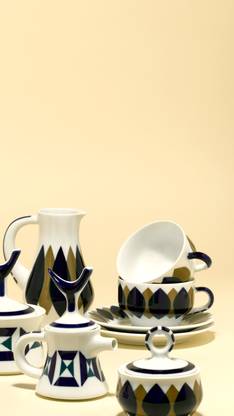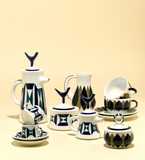Sargadelos / Galicia
Clay pride
Spain’s northwestern coast is guarding a design secret, one that Monocle has decided to share. Sargadelos is a workers’ cooperative that has been producing exquisite ceramics on and off for 200 years.

Stepping from the rickety elevator and walking across the skywalk into the first floor of the Sargadelos factory in Cervo is like wandering through the doors of a primary school art department. There are potters’ wheels, design scraps pinned haphazardly to corkboard, trestle tables lining the walls. Even the canteen smells reassuringly like the early 1980s.
“I’ve been working here for 25 years,” says Gregorio Campillo, Sargadelos’s manufacturing director, “I even live here,” he continues, pointing at the houses behind the factory. “Most people stay with us for life. Now come, we have been waiting for you in the refectory,” he says, with the pride of a head teacher guiding the school inspector. Sure enough, Sargadelos has been waiting for Monocle and by the look on some of their faces we have been keeping them from their pork knuckle and bottles of Rioja – the communal lunch is clearly important to the Sargadelos workforce.
This highly regarded ceramics company has a history dipped in that same sense of community. Antonio Raimundo Ibáñez founded the Sargadelos iron works in 1788 to manufacture weaponry for the state before the townsfolk honoured him with the title of the Marquis of Sargadelos. In 1804 he opened a ceramics plant, the first of its kind in Spain. In a quintessentially Spanish revolt, a mob of jealous industrialists assassinated the Marquis after dragging him through the streets of Ribadeo in 1809.
Such was the popularity of Ibañez’s venture that the facility remained open until 1875 when the founder’s family emigrated to Argentina. It wasn’t until 1947 that it was resurrected as a workers’ cooperative by a local group of investors and families. A sister facility, Magdalena, opened in Argentina during the 1950s where a band of Galician intellectuals, who had been exiled to Buenos Aires for their “artistic whims”, were residing. Artist Luís Seoane returned to Spain with the intention of reviving Galicia’s cultural status and set about creating the Laboratorio de Formas, a cultural institute, with his friend Isaac Díaz Pardo in 1963.
Between them they also founded the Carlos Maside Museum and the Castro publishing company, dedicated to preserving Galician culture in Sada, close to La Coruña. Sargadelos Ceramics was given fresh impetus when Seoane began designing pieces and the firm built the current circular production building and cultural centre in 1970.
Today, the 120 workers produce close to one million pieces of porcelain every year – surprising considering the brand is largely unknown outside of the Iberian Peninsula. The raw material used to make the ceramics is kaolinite, a quartz-like solid clay, which is mined close to the factory. Sargadelos kaolin is of such high quality that even German porzellan giants Meissen has been known to use it.
All plates, coffee pots, cups, serving jugs, figures and dinner services are designed in-house. Motifs are inspired by Galician history – Monférico (pictured previously) was based on the façade of the Monfero monastery that is between Cervo and La Coruña
A mould is created from plaster and liquid kaolin is poured into the cast and “cooked” at 900C. Decoration is painted onto this “cake”, before the glaze is added and the piece is baked in the 24-hour kiln at 1,435C. From design to quality checks, a single item can take up to a day to complete.
“We produce porcelain from hundreds of designs, both old and new,” says Campillo. “We are working on models by Dutch artist Eddy Varekamp and local ceramicist Xavier Toubes. It’s a mix of classic and contemporary.”
Sargadelos is relatively inexpensive, a 12-piece dinner set costs little more than €100. It is not the affordability of the porcelain that is the draw for families across Spain. Spaniards are fiercely patriotic and Sargadelos offers them the opportunity to buy into pieces of history, provenance and a revered workers’ cooperative. Sitting down to a Galician feast of pork, patatas bravas and stuffed pimientos and discussing the benefits of working for a co-operative (which has a swimming pool) is testament to that. sargadelos.com


